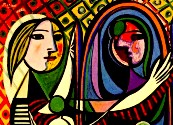|
We walk by faith, not by sight - by hearing the Word of God, heeding what the Spirit of God is saying to the heart... For now we "see through a glass darkly," which literally means "in a riddle" (ἐν αἰνίγματι). A riddle is an analogy given through some resemblance to the truth, though quite often the correspondences are puzzling and obscure. Hence, "seeing through a glass darkly" means perceiving obscurely or imperfectly, looking "through" something else instead of directly apprehending reality. We see only a reflection of reality, and our knowledge in this life is indirect and imperfect. This is contrasted with the "face to face" (פָּנִים אֶל־פָּנִים) vision and clarity given in the world to come, when our knowledge will be clear and distinct, and the truth of God will be fully manifest and no longer hidden. Being "face to face" with reality means being free of the riddles, the analogies, the semblances, etc., which at best adumbrate our way.. Such reflection should make us humble whenever we share our faith. "Now we know in part, but then shall we know in whole" (1 Cor. 13:12). An honest theology must find a place for mystery, for "seeing through a glass darkly," and for the apprehension of awe and wonder.
Since God is the Infinite One (אֵין סוֹף) whose understanding is without limit (Psalm 147:5), we must use analogies, metaphors, symbols, allusions, parables, poetry, and other linguistic devices to convey spiritual truth and meaning. We compare (συγκρίνω) spiritual things with spiritual (1 Cor. 2:13). Some mystics have said the way to God is through the transcendence of words altogether, though most use imagery and poetry about "ineffable" reality. Others, like Soren Kierkegaard, use "indirect communication" to evoke the decision to believe, to find hope, and to walk by faith. Yeshua himself regularly used parables and stories to communicate deeper truths about ultimate reality. He likened the human heart to "soil" into which the Heavenly Farmer plants seed; he wanted his followers to know God as "heavenly Father," the idealization of family love, and so on. Often he was surprised at how dull his own disciples were regarding his use of spiritual analogies (Matt. 15:16, 16:9-11; Mark 8:17; John 6:22-66). Furthermore Yeshua often taught in parables because they simultaneously conceal and reveal the truth. A parable obscures the truth to those who don't really want it; just as it reveals the truth to those who do (Luke 8:9-10). Since Yeshua's whole life was a parable of sorts - a "disguise" that led to the victory of our deliverance (Phil. 2:7) - it is not surprising that he regularly used "figures of speech" to provoke people to examine their own heart attitude and faith... In this connection note that Yeshua never explained the "mysteries of the kingdom of God" directly to the crowds, nor did He ever pander to the crowd's clamor or interests. His message is always meant for the individual soul who was willing to follow Him -- to the one who had "ears to hear." Yeshua will forever be the Face of God to us, our Mediator and Savior, blessed be He (2 Cor. 3:18).
Just as there are hundreds of Names of God given in Scripture, so there are many analogies to help us understand His heart. For instance, God is likened to a farmer, a shepherd, a caring neighbor, a tenant, a king, an impartial judge, a pottery maker, an investor, an employer, a jilted husband, a passionate lover, and so on. However, the analogy Jesus used the most was that God is our Father, and we are His children. As it is written in the Psalms, "Like a father pities his children, so the LORD pities those who fear Him" (Psalm 103:13). The most intimate Name of God is simply Abba (אבּא), a term of endearment for a child uses for his father. For those who can believe, the eyes of the LORD are like those of a loving father who greatly rejoices over the presence of his child.
<< Return
|

